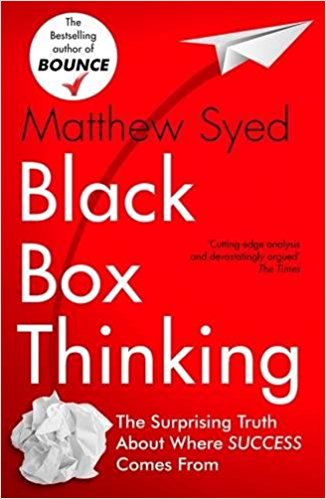Black Box Thinking, or Learning from Failure
06/09/2017


We were just reflecting at the latest Round Table on Matthew Syed’s book “Black Box Thinking” (2015, John Murray Publishing, London) and in particular on learning from failure.
So what I have done here is pull out some of the lessons which are really relevant for organisational learning. Syed compares the learning culture of the US Health Care Industry with the Aviation Industry and talks a lot about transparency, openness, reporting and the opportunity to learn from mistakes. The quote I really love is from Sullenberger (page 44) reflecting on his UA Airways Flight in 2009 which he “successfully” landed in the Potomac River after losing all his engines in a bird strike.
“Everything we know in aviation, every rule book, every procedure we have, we know because someone, somewhere died … We have purchased at great cost, lessons literally bought with blood that we have to preserve as institutional knowledge and pass on to succeeding generations. We cannot have the moral failure of forgetting these lessons and have to relearn them.”
Syed also talks about organisations being open to learning or not.
“For our purpose, a closed loop is where failure doesn’t lead to progress as information on errors or weaknesses is misinterpreted or ignored; an open loop does lead to progress because the feedback is rationally acted upon.” (page 15)
From the book we also distilled a list of reasons why organisations don’t learn.
- Lack of failure
- Sometimes caused because you haven’t failed
- Sometimes caused because you play safe so avoid failure
- Blame culture
- Feedback
- Speed of feedback – the faster the better
- Clarity of feedback – so you can’t fudge the issue
- Granularity of the evidence – ditto
- Lack of retrospective review – do you do post investment reviews?
- Hierarchy
- A problem is when knowledge is handed down not discovered
- Culture of “inconvenient evidence”
- Top down v bottom up learning
- Language of a profession
- Is it an Error or complication? If the latter, you are obfuscating the fact a failure occurred
- Limit of an investigation
- Ask the “5 Whys”
And finally, some challenging questions to ask yourself about whether or not you learn as an individual. Syed’s comment is if you answer no to any of the following, then you are not open to learn!
- Do you fail in your judgements?
- Do you ever get access to the evidence that shows where you might be going wrong?
- Are your decisions ever challenged by objective data?
Mike Bourne
Categories & Tags:
Leave a comment on this post:
You might also like…
Keren Tuv: My Cranfield experience studying Renewable Energy
Hello, my name is Keren, I am from London, UK, and I am studying Renewable Energy MSc. My journey to discovering Cranfield University began when I first decided to return to academia to pursue ...
3D Metal Manufacturing in space: A look into the future
David Rico Sierra, Research Fellow in Additive Manufacturing, was recently involved in an exciting project to manufacture parts using 3D printers in space. Here he reflects on his time working with Airbus in Toulouse… ...
A Legacy of Courage: From India to Britain, Three Generations Find Their Home
My story begins with my grandfather, who plucked up the courage to travel aboard at the age of 22 and start a new life in the UK. I don’t think he would have thought that ...
Cranfield to JLR: mastering mechatronics for a dream career
My name is Jerin Tom, and in 2023 I graduated from Cranfield with an MSc in Automotive Mechatronics. Originally from India, I've always been fascinated by the world of automobiles. Why Cranfield and the ...
Bringing the vision of advanced air mobility closer to reality
Experts at Cranfield University led by Professor Antonios Tsourdos, Head of the Autonomous and Cyber-Physical Systems Centre, are part of the Air Mobility Ecosystem Consortium (AMEC), which aims to demonstrate the commercial and operational ...
Using grey literature in your research: A short guide
As you research and write your thesis, you might come across, or be looking for, ‘grey literature’. This is quite simply material that is either unpublished, or published but not in a commercial form. Types ...







Mike, Some very good comments and observations here that complement the book review we did late last year. You see these sorts of failures every day – just last night I was watching the News and the report was about the plight of the Rohingya Muslims being subjected to genocide or clear out by the regime in Myanmar, and the relatively new President Aung San Suu Kyi (thought of as a saviour of human rights) essentially denying it is happening.